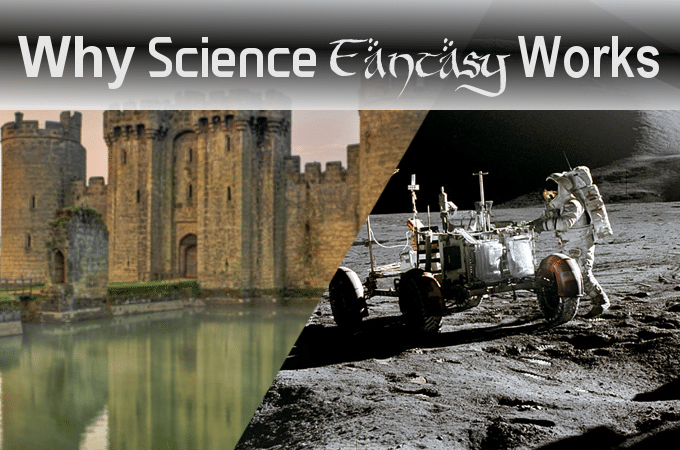I hear the question come up every once in a while: “Can I write fantasy set in a sci-fi universe?”
There seems to be some cognitive dissonance involved with the meeting of these two genres, and it comes down to preconceptions about what each really is. Essentially there are three branches of speculative fiction:
- Science Fiction – Which explains things that don’t exist in our world through the lens of science we don’t currently either possess or understand.
- Fantasy – Which calls things that don’t exist in our world magic.
- Alternate History – Which posits things that could have happened in our world, but didn’t.
Alternate history has some strong overlap with fantasy, but once you add magic, the genre shifts. But what about science fiction and fantasy? Isn’t it possible to have both advanced science and magic in the same world?
The answer is YES!
Fallacy #1: Fantasy takes place in the past
I recently talked about Medieval Stasis in fantasy. If someone says “fantasy story” to you, odds are you assume it’s set in a faux medieval realm, possibly very Arthurian in flavor. Knights, kings, wizards, castles, and swords, all pop readily into the imagination.
You can blame Tolkien if you want–a lot of blame gets dumped in his lap for the state of modern fantasy. But you can also point to George R.R. Martin, Brandon Sanderson, Robert Jordan, Patrick Rothfuss, and a whole host of other popular authors who set their stories in the medieval or Renaissance eras (or their own world’s equivalent).
But that’s just the beaten path. There’s nothing stopping modern fantasy settings. There’s a whole genre for Urban Fantasy, most of which is set in the present day. And there is plenty of science in the modern world, even if the main plot revolves around witches, vampires, or faeries.
Fallacy #2: “Any sufficiently advanced technology is indistinguishable from magic.”
Arthur C. Clarke is credited with this bit of wisdom. It reflects a world view that a belief in magic is just the absence of understanding science. This is an excellent lens for showing the reaction of modern people to advanced science. And if you are dealing with misunderstood science, this is fine. What becomes a problem is when people try to form a corollary and say.
“Any sufficiently advanced magic is indistinguishable from technology.”
Well, this one can be a bit of a downer. Magic is just science, after all? If I get a degree from Super-Future-Science University, I can look forward to a boring corporate job conjuring demons? Well, that just feels… mundane.
When I write a world, I like to think that I have final say over how that sort of thing works. Given that I don’t like magic to be just a different branch of science, I choose for it not to be. Magic is magic. It breaks the rules of science. Since magic doesn’t exist in the real world, any decisions a writer makes about it will be unrealistic. The trick is to still make it believable. If you make magic believable in your world, it doesn’t matter what the particular rules are. If you want magic to be science, that’s your call, but it’s not something to have to follow.
Fallacy #3: Science Fantasy is a small niche, and not many people are into it
Really? If anyone believes this, I think it’s a failure on behalf of the marketing department of science fantasy (yes, I know, genres don’t have marketing departments… maybe they should, though). Rather than try to launch a counter-argument, I’m just going to list science fantasy franchises. Maybe you’ll have heard of a few.
- Star Wars
- A Princess of Mars (a.k.a. John Carter)
- Dragonriders of Pern
- Dune
- His Dark Materials (including The Golden Compass)
- Flash Gordon
- Final Fantasy
- Black Ocean
- Marvel Universe (Thor, The Avengers, Fantastic Four, and so on)
Mixing the two genres by pitting science against magic, having wizards exist in the future, or having telekinetic samurai blowing up space stations is nothing new. The main problem is that not that many people use the term sci-fantasy or science fantasy. If you look for it, there’s plenty out there, not the least of which is one of the most popular franchises in history.


I’ve always considered magic more of illusionary tricks. I’m working on a children’s fantasy since the animals can do things not normally done by their counterparts or humans. I consider sci-fi something that has the possibility of really happening; and fantasy as something that only happens in our imagination.